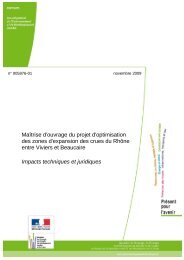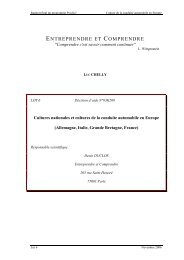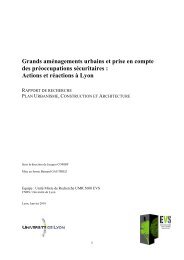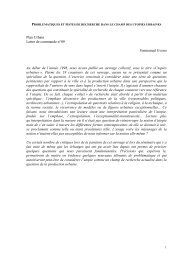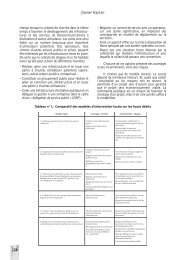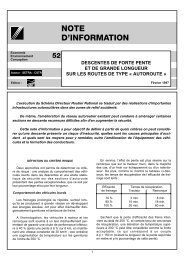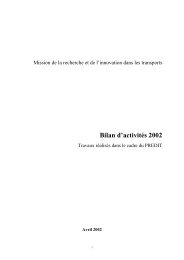des tic et des territoires - Portail documentaire du ministère de l ...
des tic et des territoires - Portail documentaire du ministère de l ...
des tic et des territoires - Portail documentaire du ministère de l ...
You also want an ePaper? Increase the reach of your titles
YUMPU automatically turns print PDFs into web optimized ePapers that Google loves.
88<br />
vision of telework. It has always been a fairly hazy<br />
notion, which can cover very different working situations.<br />
Classical forms of telework are rather well<br />
known but new forms of distance working are concerning<br />
more and more activities and workers.<br />
A general scenario for the future for all forms of<br />
telework is not relevant. The challenge for the future<br />
has to be envisaged differently according to the purposes<br />
of telework, which can be consi<strong>de</strong>red as:<br />
– means for integration and cohesion: in this case telework<br />
is generally organised with the support of<br />
public funds and, very often, a specific attention is<br />
paid to the status conditions of the workers;<br />
– a way for implementing flexible work patterns and<br />
for s<strong>et</strong>ting up more flexible organisational m<strong>et</strong>hods:<br />
it combines classical forms of flexible working<br />
(part-time work, short-term contracts, polyvalence,<br />
24-hours office operation) with the new<br />
potential of advanced communication technology;<br />
in this second case, telework or distance working<br />
are corporate initiatives in response to large<br />
trends in the organisation of the economy.<br />
There are two kinds of dynamics in the <strong>de</strong>velopment<br />
of telework: policy dynamics and mark<strong>et</strong><br />
dynamics. Distance working enterprises, mobile<br />
work and mixed telework are pushed by mark<strong>et</strong><br />
forces. Such projects must be profitable and comp<strong>et</strong>itive.<br />
Telework is used as a means for increasing<br />
the flexible response of the firms to economic pressures.<br />
Projects driven by policy dynamics have different<br />
purposes, such as revival of rural areas, local<br />
<strong>de</strong>velopment, training and insertion of unemployed<br />
and disabled people, job creation, re<strong>du</strong>ction of<br />
transport congestion. They are <strong>de</strong>veloped within<br />
public programmes or through institutional partnerships<br />
associating enterprises and public authorities.<br />
In both cases the challenges will be different.<br />
For the projects driven by policy dynamics, the viability<br />
and the diffusion of the pilot projects are central,<br />
whereas in the second case the working and<br />
contractual features are core issues.<br />
Two Visions for the Development of Flexible<br />
Work Prac<strong>tic</strong>es in Distance Working<br />
The search for flexibility in the organisation of<br />
economic activities and the organisation of work is<br />
not a feature specific to distance working. But the<br />
very nature of distance working makes it a choice<br />
field for implementing a large range of forms of<br />
flexibility. Certain forms of flexibility have already<br />
been tested in other types of working organisation,<br />
like part-time work, short-term contracts and variable<br />
hours, for example. Nevertheless, certain forms<br />
of flexibility are more par<strong>tic</strong>ularly specific to dis-<br />
Patricia Vendramin<br />
tance working: itinerant work, multiple working<br />
places, availability on stand-by, multi-tasking, selfemployment<br />
at a distance, 24-hour office operation<br />
systems, <strong>et</strong>c.<br />
This general drive toward flexibility affects all<br />
elements of work: contents, working time, reward<br />
schemes, place of work, <strong>et</strong>c and therefore leads to a<br />
broad re-<strong>de</strong>finition of what we think of as “work”.<br />
The traditional views on the separation of periods<br />
<strong>de</strong>voted to training (in the early stages of life) and<br />
work (from a certain point onwards), on employment<br />
(stable and full-time), on the roles of the regulatory<br />
framework (fixed rules and ‘normative’<br />
in<strong>du</strong>strial relations) are being replaced by more<br />
“blurred” visions.<br />
Opinions differ greatly on the perception of<br />
flexibility of distance working. Two main attitu<strong><strong>de</strong>s</strong><br />
may be i<strong>de</strong>ntified:<br />
1. An optimis<strong>tic</strong> point of view, which stresses<br />
the new opportunities available for workers in terms<br />
of acquisition of new skills, conciliation of working<br />
time and social commitments, autonomy and<br />
“empowerment”. Such an optimis<strong>tic</strong> approach to<br />
flexible work can integrate the following dimensions:<br />
a constructive approach to technological and<br />
organisational options; an improvement of working<br />
and living conditions; a broa<strong>de</strong>r approach to social<br />
relations on the job.<br />
2. A pessimis<strong>tic</strong> and indivi<strong>du</strong>alis<strong>tic</strong> point of<br />
view, which emphasises the risks of a “two tier” soci<strong>et</strong>y,<br />
of strict control on workers performance<br />
(through ICTs) and higher pressure to conform.<br />
In this vision, distance working allows to apply the<br />
«just-in-time» principle to human resources. For<br />
companies, the goal is to employ the right person at<br />
the right time, wherever that person may be, by giving<br />
priority to commercial contracts (with subcontractors,<br />
self-employed workers, and temporary<br />
companies) and without the constraints of continuity<br />
associated with an employment contract.<br />
Flexibility of skills, working hours and wages is<br />
organised on an indivi<strong>du</strong>al basis.<br />
The social risks related to indivi<strong>du</strong>alisation of flexible<br />
work can already be observed: lack of control<br />
over the management of one’s time, absence of<br />
monitoring of health and saf<strong>et</strong>y, isolation, harassment<br />
of portable telephones, the loss of the social<br />
ties at work, increasingly difficult training possibilities,<br />
little chance of perfecting skills, loss of qualification<br />
as a result of the lack of exchange of experience<br />
and training.<br />
The real challenge that faces <strong>de</strong>cision-makers in<br />
the poli<strong>tic</strong>al and labour worlds today is to strike a<br />
balance b<strong>et</strong>ween the flexibility of work and the<br />
workers’ security.




